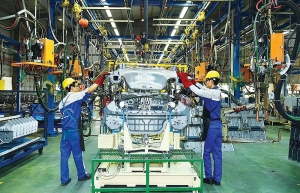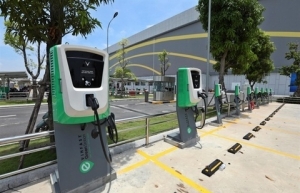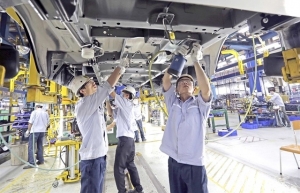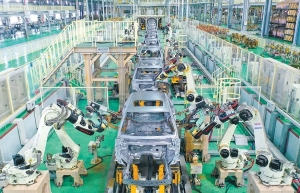Targeted support can increase prospects for vehicle industry
By definition, the automobile industry comprises a wide range of companies and organisations that are involved in the designing, research and development, manufacturing, marketing, selling, doing after-sales services and modification of automobiles. The industry is one of the world’s largest by revenue (from 16 per cent such as in France up to 40 per cent in countries like Slovakia). It creates 2.3 million jobs in Japan and 1.6 million direct jobs in the US.
 |
| Vu Tan Cong, deputy general director Vietnam Automobile Industry and Trade Consulting |
The development of the industry mainly depends on three factors: the automobile market (both domestic and foreign), central and local government policies, and the capacities of companies/organisations involved in the industry.
At present, Vietnam has 50 units of automobiles per 1,000 people, very low figure as compared with other neighbouring countries in Asia, such as 612 units per 1,000 people in Japan, 535 units in Malaysia, and 458 units in South Korea.
With a large population and GDP per capita of as much as $4,200, Vietnam has very high potential to develop its automobile market.
The market of a nation depends, in turn, on four factors: government policies on the industry, policies on the possession and use of automobiles, the development of infrastructure, and GDP per capita along with population.
Before reaching customers, automobiles are subject to the import taxes on imported completely knocked down (CKD) kits and parts, components for the locally assembled and on imported completely built-up (CBU) vehicles.
For imported CKD kits, import tax rates are 15-18 per cent for passenger cars, 12-15 per cent for trucks, and 10-12 per cent for buses. Except for imported CBU vehicles meeting the in-block localisation ratios required by the free trade agreements, the CBU import tax rates are about 30-60 per cent. These import taxes make car prices higher.
To reduce the assembled vehicle prices and support companies, it is advisable for manufacturers to use locally produced parts and components. This will increase the assembled automobiles’ localisation ratios that will, in turn, reduce other taxes and fees.
Under 24-seat automobiles are subject to the special consumption tax (SCT) that are 35-150 per cent for passenger cars, and 15-25 per cent for minibuses and medium buses. These taxes also make prices higher.
To increase Vietnam’s market size and protect and develop local manufacturers, it is proposed that the SCT on automobiles be reduced in line with the vehicle localisation ratios by value. When the ratios are 40 per cent and over, the SCT rates are zero. By doing so, prices will be more affordable.
For electric vehicles, CKD kits and CBU import tax rates, SCT rates, VAT rates, and ownership-transfer fees are all zero, no matter the localisation ratio.
Both central and local governments must have more incentive and support policies on the development of the charging station network nationwide to encourage customers to use e-cars. They also need policies on new urban area development, road systems connecting these new areas to city centres, and the development of multi-level parking areas in the city.
In addition, the central government is advised to promulgate support and incentive policies to the industry’s firms that include bank interest support, priority in finance arrangements, tax exemption on imported equipment, and materials for parts production.
Furthermore, the central government should provide (free of charge or partly support in training fees) firms with professional training on business management fundamentals, market research skills, consumers’ insights, product strategy, and marketing and sales strategy. These training courses could be implemented by experts and scholars in the related sectors, both outside and inside the country.
The local governments where enterprises are located are also advised to promulgate policies on land lease prices that are as low as possible.
 | Cooperation crucial to build competent auto industry As Vietnam makes strides to become a developed country by 2045, the number of personal vehicles is constantly rising. To develop the local automobile industry, a strong network of localised supporting manufacturers is required. Yet, domestic supporting industries are still weak, leaving the Vietnamese automobile industry at the bottom of the global supply chains. |
 | New policies being considered for electric cars Deputy Prime Le Van Thanh has asked the Ministry of Industry and Trade to study policies to promote the development of the domestic automobile industry, in line with the growing global trend towards electric cars. |
 | 50 per cent cut in automobile registration fees to be effective from July 1 The decree aims to help enterprises in the domestic automobile manufacturing industry who are faced with high surplus inventory alongside reduced access to capital, high interest rates, changes in exchange rates, and inflation. |
 | Quang Nam set for car industry upgrade Quang Nam province will raise the quality of its automobile industry and mechanical manufacturing to become an important field for the development of the province, according to its official planning. |
What the stars mean:
★ Poor ★ ★ Promising ★★★ Good ★★★★ Very good ★★★★★ Exceptional
Related Contents
Latest News
More News
- Citi economists project robust Vietnam economic growth in 2026 (February 14, 2026 | 18:00)
- Sustaining high growth must be balanced in stable manner (February 14, 2026 | 09:00)
- From 5G to 6G: how AI is shaping Vietnam’s path to digital leadership (February 13, 2026 | 10:59)
- Cooperation must align with Vietnam’s long-term ambitions (February 13, 2026 | 09:00)
- Need-to-know aspects ahead of AI law (February 13, 2026 | 08:00)
- Legalities to early operations for Vietnam’s IFC (February 11, 2026 | 12:17)
- Foreign-language trademarks gain traction in Vietnam (February 06, 2026 | 09:26)
- Offshore structuring and the Singapore holding route (February 02, 2026 | 10:39)
- Vietnam enters new development era: Russian scholar (January 25, 2026 | 10:08)
- 14th National Party Congress marks new era, expands Vietnam’s global role: Australian scholar (January 25, 2026 | 09:54)

 Tag:
Tag:
















 Mobile Version
Mobile Version